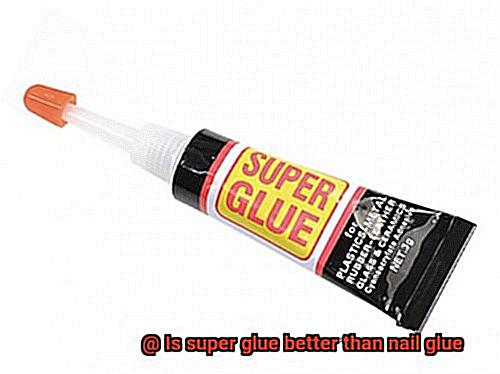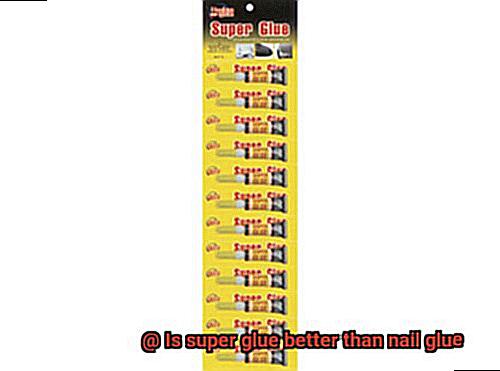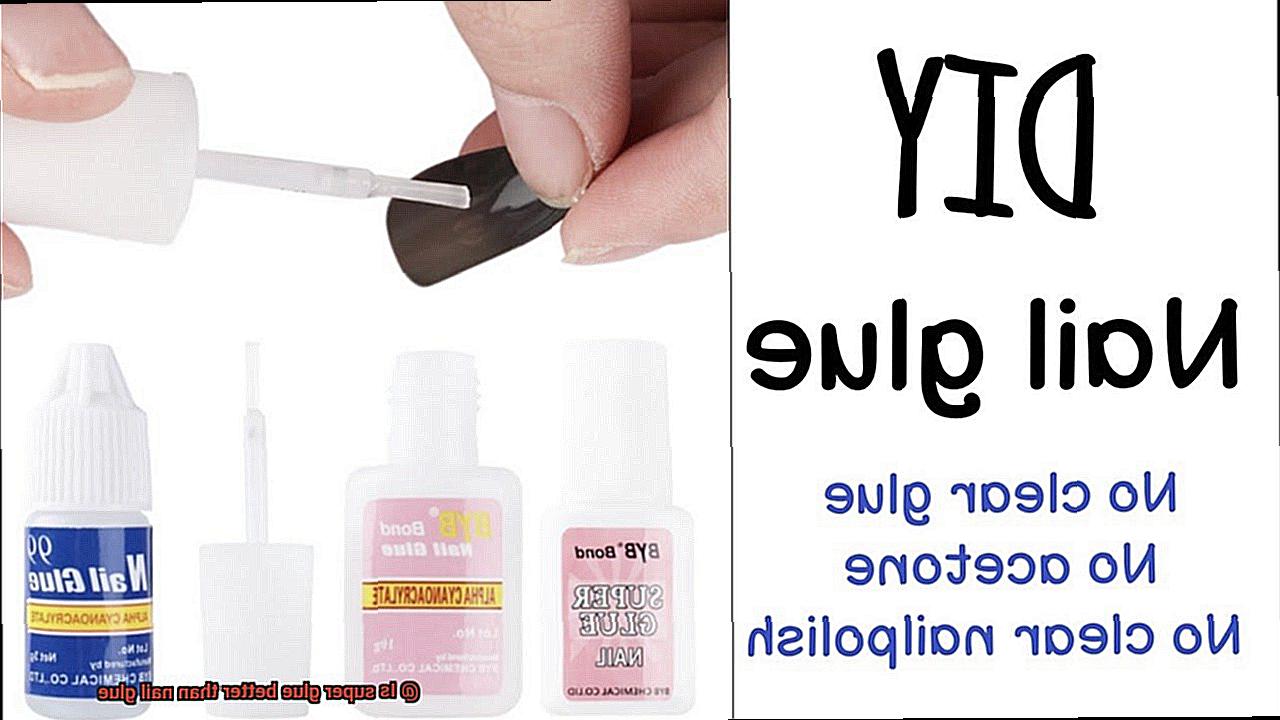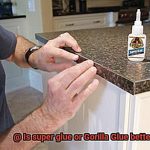Prepare for a battle of epic proportions, my friends. Today, we’re diving headfirst into the riveting world of adhesive choices and pitting two heavyweights against each other: super glue and nail glue. These bad boys have captured the hearts and minds of DIY enthusiasts and beauty gurus everywhere, but which one reigns supreme? Buckle up as we take a deep dive into the pros and cons of these sticky solutions, helping you make an informed decision that suits your specific needs.
Let’s kick things off with super glue. This stuff is like a superhero in a tiny bottle, boasting lightning-fast setting times and the power to bond just about anything together. From rescuing broken household items to fixing up your favorite bling or securing tiny trinkets, super glue is the ultimate go-to option. It’s tough as nails (pun intended) on non-porous surfaces, creating bonds that can withstand even the harshest conditions life throws at them.
Now, let’s turn our attention to nail glue – the unsung hero of manicures everywhere. This specialized adhesive is tailor-made for attaching artificial nails or tips with finesse. Its unique formulation ensures maximum adhesion and durability for your fabulous nail enhancements. Nail glue dries in a flash and holds on tight, ensuring your manicure stays flawless for days on end. However, it’s worth noting that its talents are mostly limited to nails, making it less versatile than its super-powered counterpart.
While both glues pack some serious bonding punch, they do have their limitations. Super glue might not be able to handle extreme heat like a champ, so keep that in mind if you’re planning any fiery experiments. And be warned – if you don’t handle it with care, super glue can leave behind some unsightly residue or create a sticky situation you’d rather avoid. On the flip side, nail glue might not work its magic as effectively on surfaces that aren’t nails due to its specialized formula.
So, how do you choose between these adhesive powerhouses? Well, it all comes down to your project’s needs. If you’re searching for an all-around superstar adhesive that sets fast and holds strong across a wide range of materials, super glue is your knight in shining armor. But if you’re focused solely on achieving flawless nails that could rival a professional salon job, nail glue is your secret weapon for success.
What is Super Glue?
Contents
Super glue, also known as cyanoacrylate adhesive, is a remarkable and fast-acting adhesive that has become a staple in multiple industries and household applications. It is a clear, liquid adhesive that forms an incredibly strong bond when it comes into contact with moisture, typically within seconds. The main ingredient in super glue is cyanoacrylate, a chemical compound that was discovered in the 1940s by Dr. Harry Coover while working on developing clear plastic gun sights for World War II.
What sets super glue apart is its versatility. It can bond a wide range of materials together, including plastics, metals, ceramics, rubber, and even some fabrics. This adhesive works by creating a chemical reaction when it encounters moisture on the surfaces being bonded or in the air. This reaction causes the liquid adhesive to polymerize and solidify into a strong bond.
One of the standout features of super glue is its rapid drying time. Unlike other adhesives that require extended periods of curing time, super glue sets quickly, often within seconds or minutes. This attribute makes it perfect for quick repairs or projects that demand immediate bonding.
When it comes to strength, super glue doesn’t disappoint. Once fully cured, the bond created by super glue can withstand significant force and stress. Its tensile strength is impressive, allowing it to hold up even under challenging conditions. However, it’s important to note that the precise strength can vary depending on the specific brand and formulation of super glue.
Additionally, super glue exhibits excellent resistance to temperature fluctuations, moisture, and chemicals. It remains effective in both extreme indoor and outdoor environments. Furthermore, super glue boasts a long shelf life and stability. When stored properly, it can remain usable for an extended period without losing its adhesive properties.
What is Nail Glue?
Nail glue is more than just a solution for weak and brittle nails or a way to make your nail art last longer – it’s a magical potion that can transform your nails into works of art. This adhesive superhero comes in a little bottle, ready to work its wonders on your nails.
Let’s dive into the amazing uses of nail glue. First up, we have the classic application – attaching artificial nails or nail tips. With nail glue, you can achieve the length and shape of your dreams without waiting for your natural nails to catch up. No more struggling with weak or brittle nails that just won’t grow.
But wait, there’s more. Nail glue is also a lifesaver when it comes to repairing broken or chipped nails. Simply apply a little bit of glue to the broken pieces, stick them back together, and voila. Your nail is good as new (well, almost). It’s like having a handyman in your pocket for those unexpected nail emergencies.
And let’s not forget about the fun stuff – nail art. Nail glue is an essential tool for all you creative souls out there. With its super-strong bond, you can attach all sorts of decorative elements to your nails – rhinestones, gems, sequins, you name it. Your nail designs will stay intact for days on end, making sure you’re always the talk of the town.
So what makes nail glue so special? The secret ingredient is cyanoacrylate – a powerful adhesive that forms a quick and strong bond with surfaces. It’s like the glue equivalent of a superhero cape, ready to save the day with its lightning-fast drying time. But remember, not all nail glues are created equal, so make sure to choose one that suits your needs.
Viscosity of Super Glue and Nail Glue

Prepare for a sticky journey as we explore their thickness and consistency and uncover how these factors impact their respective uses.
Super Glue’s Low Viscosity:
Imagine a liquid so thin it effortlessly slips through the tiniest gaps in the blink of an eye. This is the essence of super glue, known for its incredibly low viscosity. It serves as the ultimate superhero of bonding materials, offering a strong and instantaneous bond. Like a reliable sidekick, super glue can infiltrate even the most hidden corners, ensuring quick fixes and robust connections.
Nail Glue’s Controlled Viscosity:
In contrast, nail glue boasts a slightly higher viscosity compared to super glue. Why? The answer lies in control. Nail glue requires secure attachment of artificial nails without compromising the natural ones. Its slightly thicker consistency prevents excessive spreading or dripping during application, providing precision and ease.
Diverse Purposes and Applications:
The divergence in viscosity between super glue and nail glue extends beyond consistency; it reflects their intended purposes. Super glue’s low viscosity makes it the go-to adhesive for bonding metal, plastic, or wood in lightning-fast fashion. Its ability to seep into minuscule crevices creates an unyielding bond within seconds.
Meanwhile, nail glue acts as your trusted companion for achieving stunning nails. With its slightly higher viscosity, it allows for meticulous placement of artificial nails or enhancements, eliminating messy mishaps. Nail glue grants you the power to make adjustments before it sets, saving you from potential nail art catastrophes.
In this battle of viscosity, there is no clear victor. The choice between super glue and nail glue depends entirely on your specific needs and desired outcomes. If you seek a superhero bond that excels in repairs or crafts, the low viscosity of super glue is your best bet.

On the other hand, if you aspire to master the art of flawless manicures, nail glue’s slightly higher viscosity will grant you the control and finesse you crave.
Remember, when handling these potent adhesives, prioritize safety to avoid accidental skin contact or bonding. Armed with this knowledge of viscosity and its impact on super glue and nail glue, embark on your gluing adventures as the expert you are.
Strength of Super Glue and Nail Glue
When it comes to bonding materials, two powerful contenders emerge: super glue and nail glue. Both possess impressive strength, but they differ in purpose and composition, making them suitable for different applications.
Let’s begin with super glue, also known as cyanoacrylate adhesive. This adhesive wields a reputation for its unparalleled bonding prowess. Within seconds, it forms an unyielding bond that can withstand tremendous stress and pressure. Super glue is a versatile ally, capable of bonding metal, plastic, rubber, ceramics, and even some fabrics. It finds its place in repairs, crafting, and an array of household applications.
On the other hand, nail glue steps onto the scene with a specific mission: attaching artificial nails or extensions. Its formulation ensures a robust, long-lasting bond between the natural and artificial nails. The beauty industry wholeheartedly embraces nail glue as it delivers flawless results with precision and finesse.
In terms of raw power, super glue holds the crown due to its composition and intended use. However, the required strength varies across applications. When joining small plastic parts together, super glue reigns supreme with its ability to forge an exceptionally strong bond. Conversely, when seeking to attach artificial nails, nail glue takes center stage as its design caters precisely to that purpose.
When selecting between super glue and nail glue, it is crucial to consider the specific requirements of your project. Material compatibility, application method, drying time, and ease of removal must be taken into account. Adhering to the instructions provided by manufacturers is paramount to ensure you choose the appropriate glue for your intended application.
Remember that both super glue and nail glue have limitations. Super glue may prove unsuitable for certain types of plastics or applications requiring flexibility. Nail glue may not exhibit the same efficacy when bonding materials other than nails.
Durability of Super Glue and Nail Glue
In the ultimate battle of bonding, we have two contenders vying for the title of the most durable adhesive: super glue and nail glue. Super glue, also known as cyanoacrylate adhesive, is a versatile adhesive renowned for its unbeatable strength. Nail glue, on the other hand, is specifically formulated for flawless nail enhancements. Let’s delve into the details to determine which adhesive reigns supreme in terms of durability.
Super Glue: The Unbreakable Bond
Super glue, like a superhero in the glue world, derives its incredible strength from its quick-setting nature and unique chemical composition. When exposed to moisture, super glue rapidly polymerizes, creating an unbreakable bond within seconds. This adhesive is a reliable option for repairing broken items and bonding plastics, metals, ceramics, and even fabrics. Its versatility across various materials makes it a go-to choice for general repairs and crafting projects.
Nail Glue: Beauty and Strength Combined
The Differences in Durability:
- Application: Super glue excels in bonding a wide range of materials due to its versatile nature. Nail glue is specifically formulated for attaching artificial nails to natural nails.
- Material Compatibility: Super glue can bond plastics, metals, ceramics, fabrics, and more with ease. Nail glue may not be as effective when used on materials other than nails.
- Strength vs. Precision: Super glue’s quick-setting time and strong bond make it ideal for repairs requiring immense strength. Nail glue shines in delivering flawless nail enhancements with precision and finesse.
- External Factors: Both glues’ durability is affected by external factors such as temperature, humidity, and surface preparation. Proper cleaning and surface preparation are crucial for a strong and long-lasting bond for both super glue and nail glue.
Ease of Use of Super Glue and Nail Glue
In this article, we will compare and contrast the ease of use of these two adhesive heroes to help you determine which one is right for your needs.
Let’s start with super glue, also known as cyanoacrylate adhesive. This powerful adhesive is known for its fast-acting nature and incredible strength. Whether you need to bond metal, plastic, wood, or ceramics, super glue is up for the task. The ease of use of super glue lies in its small tubes or bottles with applicator tips that allow for precise application. With just a few drops, you can bond materials together in seconds. Perfect for quick repairs or small-scale projects, super glue is a reliable companion.
On the other hand, nail glue is a specialized adhesive designed specifically for attaching artificial nails or nail tips to natural nails. It is commonly used in manicures or nail extensions. Nail glue comes in small bottles with brush applicators, making it easy to apply on the delicate surface of nails. The thinner consistency of nail glue ensures even application without any mess. While nail glue may lack the versatility of super glue when it comes to bonding other materials, it excels in delivering flawless nail enhancements with ease.
When it comes to cleanup, both adhesives have their quirks. Super glue can leave behind residue on surfaces if not handled carefully and can even bond skin together if it comes into contact. Nail glue, on the other hand, is specifically formulated for nails and is less likely to leave residue or cause skin bonding. However, precautions should still be taken to ensure safe usage.
In conclusion, the ease of use of super glue and nail glue depends on your specific needs. If you require a versatile adhesive for various materials, super glue is your go-to hero. However, if you are looking for an adhesive that delivers flawless nail enhancements, nail glue is your trusty sidekick. Always remember to follow the instructions provided by the manufacturer to ensure proper usage and safety.
Additional Benefits with Nail Glues
Nail glues are here to save the day with their additional benefits that make them the ultimate sidekick for flawless nails.
Let’s start with safety. Unlike super glue, nail glues are specifically designed for use on nails, making them a safer and more suitable option. Their gentler formula is less harsh on your delicate nails and skin, ensuring a worry-free application. But that’s not all – nail glues often contain vitamins and minerals that promote nail health and growth, giving you strong and beautiful nails.
But wait, it gets even better. Some nail glues go the extra mile by including ingredients like calcium, renowned for its ability to strengthen weak or brittle nails. Worried about pesky nail infections? Fear not. There are nail glues out there with anti-fungal properties, providing an added layer of protection for your precious nails.
Say goodbye to messy application. Nail glues come equipped with a brush applicator that allows for precise and controlled application. No more accidental glue on your cuticles or surrounding skin – just picture-perfect nails every time.
And let’s talk options. With nail glues, you get to choose the thickness that suits your needs. Need extra strength? Opt for a thicker glue. Prefer flexibility? Go for a thinner one. The power is in your hands.
No more waiting around like a bored superhero. Nail glues dry quickly, reducing the waiting time and minimizing the risk of smudging or smearing your freshly glued nails. Get back to conquering the world in no time.
Water activities or frequent handwashing won’t be an issue anymore. Nail glues are water-resistant, meaning they can withstand exposure to water without losing their adhesive properties. So dive into those water adventures or wash your hands as much as you like – your nails will stay perfectly intact.
When it’s time to remove your fabulous nail creations, nail glue is easily removed with acetone-based nail polish remover. No more struggling with super glue and its stubborn residue. Nail glue removal is a breeze.
Choosing the Right Adhesive for Your Needs
When it comes to bonding two surfaces together, selecting the right adhesive is crucial. Whether you’re working on a DIY project or repairing something, the adhesive you choose can make all the difference. So, let’s dive into why it’s important to consider various factors when selecting an adhesive.
First and foremost, consider the materials being bonded. Different adhesives are designed to work with specific materials. For example, super glue is great for metal, plastic, rubber, and ceramics, while nail glue is specifically formulated for attaching artificial or repairing natural nails. It’s essential to choose an adhesive that is compatible with the materials you’re working with to ensure a strong and durable bond.
Next, consider the intended use of the adhesive. Are you looking for a quick and strong bond for general purposes? Or do you need something specifically for nail-related applications? Super glue is fast-drying and provides a strong bond for various projects, while nail glue is designed to withstand frequent hand washing and exposure to water.
Flexibility is another important factor to consider, especially when bonding surfaces that require movement. Nail glue tends to be more flexible than super glue, allowing it to bend and move with the natural nail. If flexibility is a priority, nail glue would be the better option.
Ease of use is also a critical consideration. Super glue typically comes in small bottles with precision applicators, allowing for precise application. On the other hand, nail glue often features a brush applicator that makes it easy to spread across the nail surface. Consider which type of applicator would work best for your project and personal preference.
Lastly, always remember to read and follow the instructions provided with the adhesive product. Different adhesives may have specific drying times, curing requirements, or safety precautions that should be followed. By following these instructions, you can ensure proper usage and achieve optimal results.
Also Read: Can You Use Super Glue For Fake Nails?
Conclusion
After careful consideration and analysis, it is evident that super glue surpasses nail glue in terms of effectiveness and durability.
With its unparalleled strength and ability to bond almost any material, super glue stands as the superior choice for various household repairs and DIY projects. Its quick-drying formula ensures a secure and long-lasting hold, offering peace of mind when it comes to fixing broken items or attaching artificial nails.
From repairing ceramics and plastics to securing jewelry and metal components, this adhesive powerhouse outshines its counterpart in every aspect.






